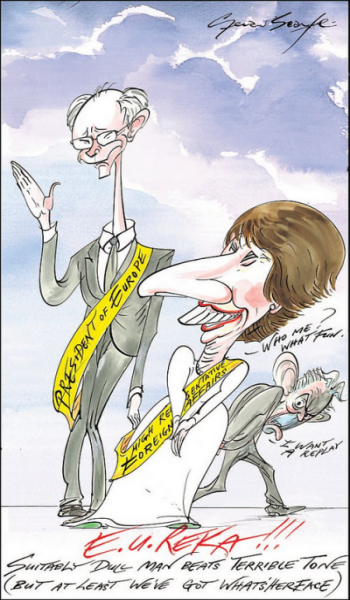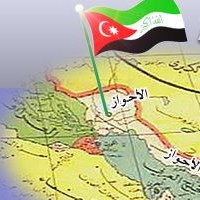Published: march 24, 2010; Ashton’s Ashes: How Europe’s Foreign Minister Repeats the Middle East’s Biggest Cliche and Why She’s Wrong.
by Barry Rubin,
Catherine Ashton is high representative of the European Union for Foreign Affairs and Security Policy and vice president of the European Commission. The fact that she holds such a position—in effect, she’s the European Union’s first foreign minister—shows Europe is in serious trouble. For Ashton’s main previous claim to fame was as a leader in the Soviet-oriented movement for nuclear disarmament of the West [and accused of taking funds from the Soviet Union during her days as treasurer for the Campaign for Nuclear Disarmament.]

Catherine Ashton, as she was then, handing in a petition to No 10 in her CND days, in 1982. She is second from right.
To describe Ashton’s op-ed in the New York Times as calling for peace at any price is no exaggeration. Of course she only means ending the Israel-Palestinian conflict, seemingly unaware that there is any other type of conflict (non-peace) in the region.
Her reasoning goes something like this: Conflict breeds poverty and radicalism; make peace and there won’t be any radicalism or poverty. And she’s referring explicitly to shoring up the rule of the radical genocidal-intending Islamist group Hamas.
But what if it is radicalism that fuels conflict and makes peace impossible? What if the radical forces will take advantage of your activities to become even stronger, creating even more instability and hence—in Ashton’s framework—far more poverty, anger, and radicalism in an endless cycle? Because that’s precisely what has happened and what is happening.
Having built her career in large part by discounting the Soviet threat, she now prospers further by dismissing the Islamist and Iranian one. Ashton argued years ago that the Cold War was just a misunderstanding and that unilateral Western concessions would solve it. That didn’t work. But having learned nothing she applies the same model to the Middle East, substituting Israeli and Western concessions as the solution.
After a recent tour of the region, she uttered the ultimate paragraph whose sentiments direct the views of Western leaders toward the Middle East. Here it is:
“Throughout the region, from Egypt to Syria, from Lebanon to Jordan, I heard the same message from presidents, prime ministers and a king, and from ordinary people, too — they want their economies to grow, their people to prosper, their children to be educated. To achieve that, we need peace in the Middle East.”
Let’s analyze this extremely important paragraph. First, there is an assumption that many people will make on reading it, that an end to the Israel-Palestinian or Arab-Israeli conflict is the key for happiness, prosperity, and friendship toward the West.
But note that peace in the Middle East doesn’t just mean the Arab-Israeli conflict. After all, if that is the criterion, the conflict on a region-wide level is over. The last general Arab-Israeli war took place in 1973, almost four decades ago. The last war between Israel and an Arab state took place in 1982, almost three decades ago. That conflict between Israel and Syria was limited. Egypt and Jordan have signed peace treaties with Israel.
Thus, the kind of conflict that preoccupied the region between 1948 and 1973 is over.
I don’t want to shade the truth in the slightest way. Obviously, Israel fought a war with Hizballah in 2006 which also involved Lebanon. But that is not the same thing. Neither Israel nor any Arab state (other than Syria) wanted the battle, which was provoked by Hizballah, and to some extent its Iranian and Syrian sponsors. The Arab states stayed out of the war, though they did urge that it end quickly.
Even a full peace agreement between Israel and the Palestinian Authority, resulting in a Palestinian state, would not solve the problem of Hizballah, or Iran, Syria, or Hamas. And for reasons I’ve addressed at length many times elsewhere, Syria doesn’t want peace with Israel.
Of course, one could still argue that concern over the plight of the Palestinians is a big factor in the Middle East. But even if one wants to argue that it affects the politics and policies of Arab states—and it really doesn’t do that very much in 2010—is this the factor preventing Arab economies from prospering and Arab children from being educated? Isn’t this a giant scam, an excuse for the shortcomings of dictatorial regimes and outdated social structures?
Sorry, people, goes the endless refrain, we can’t have democracy or better living standards or enough jobs and housing or whatever else you can name because of the poor suffering Palestinians! This is no more an accurate explanation than that of Latin American dictatorships in regard to Communism or those of the Soviet bloc in the past blaming their depredations on capitalism.
But what about the word “peace?” Of course any societies would be better off in material terms if they had peace. But peace means peace. So as long as there is ethnic and political strife in Afghanistan; civil war in Iraq; the battle between Islamists and nationalists throughout the region; sectarian conflict in Lebanon; civil war in Egypt; and a dozen other such conflicts there won’t be “peace in the Middle East.” Throw in the aggressive designs of Iran and Syria; the revolutionary efforts of Hamas, Hizballah and al-Qaida; and the ambitions of individuals, clans, tribes, ethnic groups; and more, the prospects for “peace” in the region doesn’t look good.
And that “peace” requires a defeat of the revolutionary Islamist forces, something you aren’t going to help them do. Moreover, the “peace” defined by the people you spoke with includes the preservation of the incumbent dictatorships in virtually every Arabic-speaking country.
So, representative of the European Union for Foreign Affairs and Security Policy and vice president of the European Commission Ashton, what they are really telling you is not to solve the Israel-Palestinian conflict as fast as possible to make everyone happy (they won’t help you if you try and they will continue their conflicts even if you do) but the rather obvious point that if there was a general state of peace and harmony things would be better in the region.
True enough but not the way you interpret it.
About the Author,
Barry Rubin is director of the Global Research in International Affairs (GLORIA) Center and editor of the Middle East Review of International Affairs (MERIA) Journal. His latest books are The Israel-Arab Reader (seventh edition), The Long War for Freedom: The Arab Struggle for Democracy in the Middle East (Wiley), and The Truth About Syria (Palgrave-Macmillan). His new edited books include Lebanon: Liberation, Conflict and Crisis; Guide to Islamist Movements; Conflict and Insurgency in the Middle East; and The Muslim Brotherhood.



 RSS
RSS











Why Catherine Ashton is wrong about the Middle East #israel #jcot #eu http://j.mp/8YZG2K
Why Catherine Ashton is wrong about the Middle East #israel #jcot #eu http://j.mp/8YZG2K http://ff.im/ibbPO
RT @CrethiPlethi: Why Catherine Ashton is wrong about the Middle East #israel #jcot #eu http://j.mp/8YZG2K
[…] This post was mentioned on Twitter by Elisabeth. Elisabeth said: RT @CrethiPlethi: Why Catherine Ashton is wrong about the Middle East #israel #jcot #eu http://j.mp/8YZG2K […]
RT @CrethiPlethi: Why Catherine Ashton is wrong about the Middle East #israel #jcot #eu http://j.mp/8YZG2K http://ff.im/ibbPO